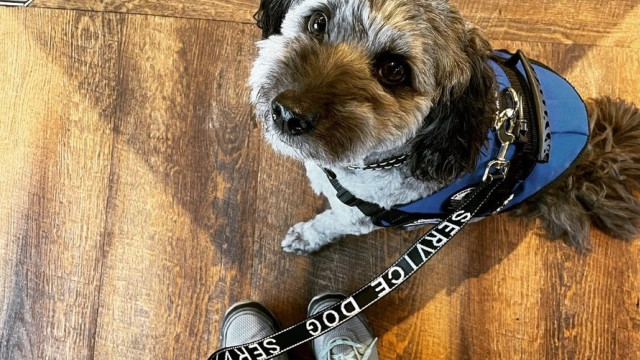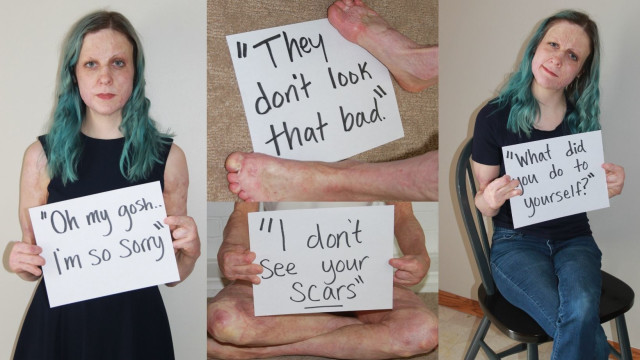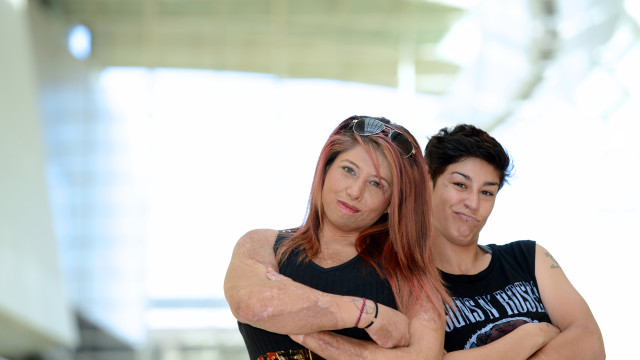Experiencing Ableism as a Burn Survivor
 Written by Michelle Lauren Anderson on October 21, 2021
Written by Michelle Lauren Anderson on October 21, 2021
“You didn’t pass your background check,” the HR staff told me.
“What, why? My background check is clean. That can’t be right."
“Your fingerprints came back inconclusive."
“I am missing some of my fingers and have severe scarring on my fingertips from a burn injury. Are you sure that isn’t the issue...?”
“We cannot accept your fingerprints."
After several accusations, I went into the HR office to get my fingerprints redone a second time—only to repeat the whole conversation again.
Then I went in for a third time to get a fingerprint background check to prove it wasn’t my "fault" and that my fingerprints were accurate in spite of what they thought their machine said.
Ironically, this was all to start a job supporting burn survivors in the hospital.
The very reason I would be working in this job was to support and educate others about challenges and barriers they would face after surviving a burn injury. Yet I was prevented from starting on time because of my own status as a burn survivor.
This is just one example of the ableism I've faced as a burn survivor—or, as I refer to it, "burnism."
Ableism is the discrimination or prejudice against people who have disabilities. Ableism can take the form of ideas and assumptions, stereotypes, attitudes and practices, physical barriers in the environment, or larger scale oppression.
—Urban Dictionary
My definition of burnism is similar, but exclusive to the discrimination and prejudice faced due to one's burn injury.
When I look at my life I have found that in new transitions, introductions to new people, and starting new roles, I am also faced with barriers and prejudice I would not experience if I lived a life without scars.
What does Ableism look like?
Not complying with disability rights laws
I was unable to enter my work building with my service dog (who I got pre-approved) for nearly 30 minutes. This is a lack of compliance with the disability rights laws in the ADA.
Asking invasive questions about their medical history or personal life.
I once went on a date and was only asked invasive medical questions—you would not ask a ‘perceived healthy person’ their medical history.
Questioning if they actually have the limitations or the extent of limitations
Instead, try listening to understand with empathy and support.
Minimizing their needs and concerns
Not respecting their boundaries, limitations, or need for accommodations
Touching or using their medical device without permission
When I was in a wheelchair - everyone wanted to push me… like I was on a ride at their will…. But those were my legs. My way of transportation— don’t touch someone’s assistance gear - wheel chair, walker, service dog without permission
Assuming they can’t do something or speak for themselves
"Get over it" / "Push yourself harder"
“You just need to push yourself harder,” a peer of mine told me once. I was absolutely jaw dropping and began to defend myself at how hard I have pushed myself just to do the ‘normal’ things he takes for granted, such as walking, typing.
Trying to fix them
Seeing the disability or burn injury as something to be fixed or changed rather than showing the person love and acceptance for who they are.
Making plans that the disabled person is unable to participate in
I got invited to a yoga class by a friend. I asked her all the appropriate questions and she assured me it was a ‘gentle yoga’ class and very laid back, so I went to the class. Sadly it was a hot yoga vinyasa class, in which the room was over 90 degrees F, I had to step outside of the room as I was getting overheated and I ended up leaving early as I couldn’t do the maneuvers because I can’t put weight on my toes or wrists without causing damage. I remember driving home trying not to cry. ‘I had asked her what kind of class it was, she had said it was gentle’. I felt like I had been misled and discriminated against in some way.
Framing something tragic as ‘inspiration’ to inspire others without their consent
I had a college coach on my riding team that would often say to me how ‘inspiring’ I was to the team. I was inspired because I did the very same thing as everyone else on the team because I had burns. It felt patronizing, and like they expected ‘less’ from someone who has overcome such adversity. I didn’t want to be their inspiration, I just wanted to be like everyone else on the team.
Saying things like “The only disability in life is a bad attitude”
This quote from Scott Hamilton and other similar sayings invalidate the fact that no amount of a positive attitude is going to change the fact that I experience hand pain and have to be mindful of this when typing to not flare up my arthritis or tendonitis or that I am prone to having wound healing issues. No amount of a positive attitude is going to help my wound heal…. And it certainly isn’t an ‘excuse,’ it is a fact.
Assuming all disabilities are visible
“Seeing is believing,” in the world we live in. In addition to my burn injury I have invisible illnesses that my burn injury has caused. Because people can’t see it, they question if it is even real.
I spent the start of my career working as a therapeutic horseback riding instructor and in burn support.
While working Therapeutic Riding lessons for those with disabilities, I could see a difference in how people treated those with disabilities. How they talked down to them, used their diagnosis to describe them rather than treat them as individuals.
This continued when I moved to a corporate career, where others didn't always accept or understand the accommodations I needed. When I began to apply for jobs after grad school, having a job where I could put my health first was my very first requirement. If I had to sacrifice my health to do my job, I would not only be left sick or in pain but even further "disabled." It doesn't seem like too much to ask for, but in this culture it can be!
Finding accommodations such as an ergonomic keyboard and mouse, an adjustable desk, and voice to text programs—as well as having my service dog Eli come into the office with me—have allowed me to do my job without sacrificing my health.
Prevent ableism and help others thrive
Educate yourself on burn injuries, amputations, and disabilities and how they influence one's life. Learn about the adaptations out there and accommodate what works best for the individual.
Believe someone when they open up and disclose about health (physical or mental), validate them and don’t hold it against them and their ability to succeed.
Don’t assume you know what someone's abilities, needs or limitations are. I am an independent adult, I know my limitations and what I need to take care of myself and can communicate those.
Respect people's boundaries regarding what they want (and don’t want to share) with you. According to the ADA, businesses are only allowed to ask me "Is your dog a service dog?" and "What tasks does he perform?" This does not however prevent individuals from asking invasive questions about him and or my scars. I have learned how to control the narrative of my story and what I tell people.
Listen to people's requested accommodations and ask them how you can support them.
Incorporate accessibility and inclusivity into your event plans.
If you are experiencing ableism or prejudice due to your burn...
List out the accommodations that will help you thrive
My accommodations list looks something like this: ergonomic keyboard and mouse, voice to text, allowing my service dog into the office, flexible break schedule. These all help me manage health symptoms I have without them interfering with my ability to do my job.
Conserve your energy by not over-explaining
Don't tell people more than you want them to know. If someone doesn’t want to understand, no amount of explaining will change their mind. Set your boundaries and focus on putting your energy elsewhere.
You can choose who you ‘hire’ and ‘fire’ in your life.
You know yourself better than anyone else. Only you can be the expert. Know what works for others, may not work for you. You’re not required to take anyone’s advice; do what feels right for you.
Discrimination can happen to anyone. I chose to focus on my abilities and what I need to achieve them rather than my limitations. Together we can help get rid of ableism and burnism and find ways for others to adapt and fit in the world we live in.

About The Author
Michelle Lauren Anderson was burned over 91% of her body at the age of two. While attending a camp for burn survivors she fell in love with horses, and learned the concept of victim - survivor - thriver, from there a vision was formed! Michelle shares her story of being a victim to trauma, to how she moved to survivor, and then thriver as she takes the reader also on the journey while educating them to be more trauma-informed in her book Survivor not Victim, Stories Behind my Scars and the Path to Thriving (Publication: Coming Soon).
Michelle started her career in equine assisted therapies teaching those with a variety of disabilities and trauma for nearly six years. She then went on and completed her Master of Arts in Strategic Leadership and Master of Business Administration in Finance and has held a variety of positions since. She now specializes in developing, implementing programs, program operations, training, and trauma-informed consulting. In her free time Michelle enjoys time with her dog Eli and with her horses. For more information or to collaborate with Michelle, please visit her website at: www.survivornotvictim.com.
Photo credit: Jamie Sukow.
Disclaimer: The stories featured on this website are personal accounts shared by individuals from the burn community. Each burn injury, recovery journey, and healing process is unique. These stories are meant to offer connection, insight, and hope but are not intended as medical advice. What worked for one person may not be appropriate for others. The perspectives shared in these stories do not necessarily represent the views of Phoenix Society for Burn Survivors. If you have medical questions or concerns, please consult a qualified healthcare professional.


